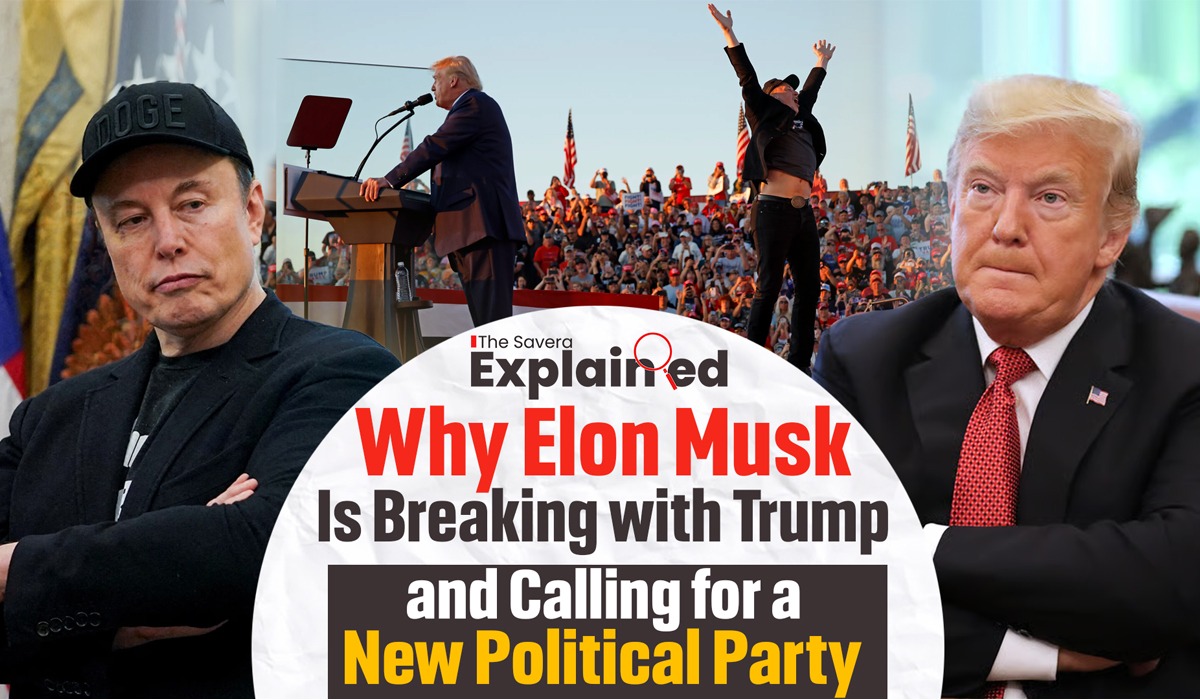
Amid the ongoing feud between Elon Musk and Donald Trump, following his fall out from US government, tech billionaire has thrust himself into the political spotlight by suggesting the creation of a new political party. The tech billionaire posted a poll on X, asking if it’s time to start a party that truly represents the “80% in the middle.” With over 400,000 people voting so far, more than 83% support the idea — showing Musk’s growing influence in American politics.
In response to a social media post by a prominent conservative suggesting Republicans may need to choose between him and Trump, Elon Musk replied, “Just some food for thought as they consider this: Trump has 3.5 years left as President — I’ll be around for 40+ more.” Musk also criticized Trump for being ungrateful, pointing out that he had spent hundreds of millions of dollars to support Trump’s re-election.
“It is time to create a new political party in America that actually represents the 80% in the middle,” Elon Musk asked as he scorched Donald Trump over the Big, Beautiful Bill.
About Trump’s Big Beautiful Bill
Trump’s “Big Beautiful Bill,” officially called the One Big Beautiful Bill Act, is a major piece of legislation pushed by former President Donald Trump during his second term. It’s a massive tax and spending package that aims to achieve several of Trump’s key priorities.
Elon Musk and Donald Trump were once close allies. Musk spent at least $288 million supporting Trump’s 2024 campaign and worked in Trump’s administration as a special government employee leading the Department of Government Efficiency (DOGE). DOGE’s job was to cut government waste and reduce spending. However, the “Big Beautiful Bill” caused a major rift between them.
Why was Musk Upset?
Musk’s DOGE team worked hard to cut government spending (they claimed to save $180 billion, though this is debated). The bill, however, increases the deficit by trillions, which Musk said “undermines” his work. He called it a “disgusting abomination” and a “massive, outrageous, pork-filled” bill, meaning it’s full of unnecessary spending.
The bill removes tax credits of up to $7,500 for people buying new EVs and $4,000 for used ones. Since Musk’s company, Tesla, makes EVs, this could hurt Tesla’s sales. Analysts say this could cost Tesla $1.2 billion and make it harder for them to compete, especially since Tesla’s sales were already struggling. Musk was frustrated because he lobbied to keep these credits but failed.
Personal and Business Conflicts:
Public Backlash
Additionally, Elon Musk faced significant public backlash for his role in the Department of Government Efficiency (DOGE), which aimed to cut government spending and led to federal worker layoffs and program reductions. Protests erupted outside Tesla’s offices, with signs like
“Musk is no savior” spotted in cities like Austin. Boycotts hit Tesla’s sales, with reports of a 12% drop in U.S. deliveries in Q1 2025, partly due to customers rejecting Musk’s political ties. He also received death threats, prompting increased security at Tesla and SpaceX facilities. The backlash tarnished Tesla’s brand, especially among progressive buyers, making Musk question the value of his government role.
Posts on X amplified the criticism, with hashtags like #BoycottTesla trending. Feeling his efforts to streamline government were underappreciated and harmful to his businesses, Musk grew frustrated, believing the personal and financial costs outweighed the benefits of his DOGE involvement.
The Public Fight
What’s Happening Now?
The feud between Trump and Musk is out in the open, and it’s causing ripples in politics and beyond. Considering the situation, Donald Trump’s aides scheduled a call between the U.S. president and Elon Musk for Friday after a huge public spat that saw threats fly over government contracts and included the world’s richest man suggesting Trump should be impeached.
A White House official said the two men would speak on Friday. The official did not give a time for the call, which could ease the feuding after an extraordinary day of hostilities – largely conducted over social media – that marked a stark end to a close alliance.
